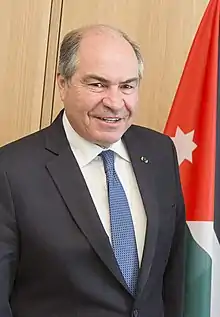Hani Mulki
Hani Fawzi Mulki (also known as Hani Mulki; Arabic: هاني الملقي; Hāni Al-Mulki; born 15 October 1951) is a Jordanian politician that held several ministerial and diplomatic positions, and he was Chief Commissioner of the Aqaba Special Economic Zone Authority before his designation as the 41st Prime Minister of Jordan by King Abdullah II and approval by the House of Representatives on 29 May 2016.[1]
Hani Mulki | |
|---|---|
| هاني الملقي | |
 | |
| Prime Minister of Jordan | |
| In office 1 June 2016 – 4 June 2018 | |
| Monarch | Abdullah II |
| Preceded by | Abdullah Ensour |
| Succeeded by | Omar Razzaz |
| Chief Commissioner of Aqaba Special Economic Zone Authority | |
| In office 9 November 2014 – 29 May 2016 | |
| Prime Minister | Abdullah Ensour |
| Preceded by | Kamel Mahadin |
| Succeeded by | Nasser Shraideh |
| Minister of Foreign Affairs | |
| In office 25 October 2004 – 6 April 2005 | |
| Prime Minister | Faisal Al-Fayez |
| Preceded by | Marwan al-Muasher |
| Succeeded by | Farouq Qasrawi |
| Personal details | |
| Born | 15 October 1951 Amman, Jordan |
| Political party | Independent |
| Relatives | Fawzi Mulki (Father) |
| Alma mater | Cairo University Rensselaer Polytechnic Institute |
Mulki served as Prime Minister until he submitted his resignation on 4 June 2018 after protests had swept the country because of his government's IMF-backed austerity measures that aimed to tackle Jordan's growing public debt.[2] The measures would raise the price of goods and services, as well as hike the tax rate.
Early life
Born in Amman in 1951, Mulki received a bachelor's degree in production engineering in Egypt in 1974 and pursued his Masters and Doctoral degrees from Rensselaer Polytechnic Institute.[3]
Career
He served as Jordan's ambassador to Egypt and as Jordan's permanent representative at the Arab League. He has held several ministerial positions; water, energy, supplies, industry and foreign affairs ministries.[4]
Mulki chaired the negotiating committee which produced the Israel-Jordan peace treaty between Jordan and Israel in 1994.[5] During his time as foreign minister, Jordan experienced diplomatic issues with both Iraq and Saudi Arabia. Mulki was appointed as Scientific Advisor to the King, and then a member of the Senate. On 9 February 2011, Mulki was reappointed as Minister of Trade and Industries. On 9 November 2014, he was appointed Chief Commissioner of the Aqaba Special Economic Zone Authority, replacing Kamel Mahadin.[6] On 29 May 2016, Mulki was appointed as the Prime Minister of Jordan, succeeding Abdullah Ensour.[4] His cabinet was sworn in on 1 June.[7] After the 2016 general election Mulki order a cabinet reshuffle, which resulted in three new portfolios, 22 ministers remaining and the introduction of 7 new ministers.[8]
Rising Jordanian public debt led Mulki in 2016 to negotiate a 3-year program $732 million loan facility with the International Monetary Fund, which would see the public debt falling from 95% of the GDP to 77% by 2021.[9] The austerity program raised prices on several food staples in 2016 and 2017, making him very unpopular in the country. A 22 March 2018 report by Carnegie Endowment for International Peace commented on Mulki's policies: "Mulki declared openly that his predecessors had left the country at the brink of insolvency and that the failure to take tough revenue-raising measure would lead to a debt crisis which would destroy the country. And he is correct. What is more doubtful is Mulki’s assertion that Jordan “will get out of the bottleneck” in 2019. While the measures to raise taxes and reduce subsidies buy time, they leave Jordan struggling to stay afloat and dependent on the continued flow of extensive aid."[10]
A nationwide strike organized by trade unions on 30 May 2018 in protest of Mulki's government presenting amendments to the 2014 income tax law to Parliament. The next day, his government raised fuel and electricity prices in response to rising international oil prices, prompting crowds of protestors to pour in the 4th circle near the Prime Ministry in Amman. King Abdullah intervened on 1 June and ordered the freeze of price hikes. Mulki's cabinet acquiesced but said the decision would cost the treasury $20 million. Despite the freeze, widespread protests continued due to the tax law. He submitted his resignation on 4 June 2018 and was succeeded by Omar Razzaz, his education minister.[2]
Honours
 Jordan:[11]
Jordan:[11]
 Grand Master of the Order of Independence
Grand Master of the Order of Independence Grand Master of the Order of the Star of Jordan
Grand Master of the Order of the Star of Jordan
 Japan:[12]
Japan:[12]
References
- "King accepts Mulki's resignation, tasks him with forming new gov't". Jordan Times. 25 September 2016. Retrieved 25 September 2016.
- "Jordan PM Hani al-Mulki resigns amid mass protests over tax bill". Al Jazeera. 4 June 2018. Retrieved 4 June 2018.
- "New Jordan prime minister is RPI graduate". Albany Times Union. 2016-05-30. Retrieved 2016-07-01.
- "King dissolves House, appoints Mulki as new premier". The Jordan News. The Jordan Times. 2016-05-29. Retrieved 2016-05-29.
- Aljazeera Jordan: Hani Mulki 'likely to improve ties with Israel', May 30, 2016
- "Mulki named ASEZA chief; Mahadin appointed as senator". The Jordan Times. 9 November 2014. Retrieved 18 June 2016.
- Omar Obeidat (2 June 2016). "Mulki's government takes oath of office before King". The Jordan Times. Retrieved 19 June 2016.
- Omar Obeidat (29 September 2016). "Mulki's new government sworn in". The Jordan Times. Retrieved 9 November 2016.
- "IMF approves $732m loan to Jordan". Arabian business. 25 August 2016. Retrieved 4 June 2018.
- "Slowing Jordan's Slide Into Debt". Carnegie. 22 March 2018. Retrieved 4 June 2018.
- "إرادة ملكية بحل مجلس النوّاب وتكليف "الملقي" رئيساً للحكومة". ammannet.net (in Arabic). ammannet.net. 2016-05-29. Archived from the original on 2020-09-29. Retrieved 2016-05-29.
- "令和3年春の外国人叙勲 受章者名簿" (PDF). Ministry of Foreign Affairs of Japan. Retrieved April 29, 2021.